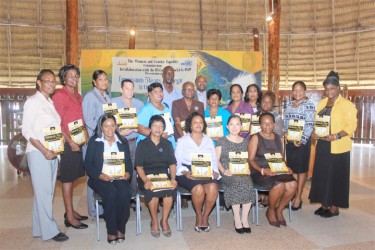Recognising that there have been performance gaps in its work the Women & Gender Equality Commission (WGEC) has come up with a five year strategic plan which it hopes would chart a course for it to monitor and protect the human rights of women and guard against discrimination.
The plan, which was launched last Wednesday and runs from 2013 to 2018, has four priorities: the organizational and institutional strengthening of the commission; women leadership and governance; women and economic empowerment and gender based violence.

Its performance gaps, the commission said, are linked to the prevailing situation whereby it has been expected to do its job within a relatively weak organizational framework that lacks adequate human and financial capabilities.
“Within the national machinery that is in place for the promotion of women and gender equality, there are obvious breakdowns in the structure,” the commission said.
It suggested that there is need for a clear understanding of what is being done by the different stakeholders so that there is coherence in the national approach. This will reduce the gaps between what they can do currently and how they work, and the future performance which is required, so activism can be increased for what needs to be done.
“With limited resources, the past performance of the commission has been creditable but with the required complement of technical expertise within the ranks of the commission and financial strength, it will be systemically capable of guiding Guyana in keeping their agreements to the national and international community,” the commission said in the plan.
According to the commission the five year plan provides an opportunity for the commission, as a body, to be introspective and refocus its approach to ensure that it can effectively address the ongoing challenges faced by its multifaceted constituencies in all sectors.
“This plan is the first attempt to have an organizational model for strategic action in place, coherently pulling together all the national and international efforts to advance women and gender equality,” the commission said in the plan.
As a result there is need for strengthened institutional structures and mechanisms in the national machinery. Gender mainstreaming and gender budgeting should be systematized and there should be a commitment to ensure that improved legislative and policy initiatives are intertwined with an enabling environment which ensures their enactment. Importantly, there is need for a national agreement to advance a statistical system for the routine use of sex disaggregated data in creating policies, programmes and projects to provide the evidence on the disparities in gender equality.
Under the head of women and leadership, the commission plans to collaborate with the Ministry of Education in addressing socialisation and influence in the formation and reinforcement of cultural norms and stereotypes around gender in schools. It will also partner with the Rights of Child Commis-sion (RCC) and the media. The commission said it will be advocating for women’s advancement in decision-making at both the national and local level in the private sector, pointing out that currently there are no women mayors or chairpersons in local government, and that women are still under represented on boards and as directors in the private sector.
To address the issue of economic improvement for women the commission said that it will begin with legislative scrutiny and other initiatives that ensure parity in pay, that women are competent for the job market and benefit from equal opportunities in the workforce. The plan also proposes a package of re-education and training that moves away from the girl child being socialized to think in stereotypical ways, to understand that she has the right to work in any sector and to equal opportunities with her male counterpart. The training also seeks to build the competence and confidence of women to access financial institutions and gain control of their assets.
According to the commission the circumstances of rural and hinterland women will be specifically addressed as their divergent needs and circumstances must be contextualized. “Getting indigenous school aged girls to stay in school as well as the reintegration of teenage mothers in school is critical since education increases opportunities in the economic arena,” it stated, adding that it opens the door for inter-commission collaboration as the special issues of the indigenous girl child and woman are addressed.
Meanwhile, it was noted that in spite of pertinent legislative reforms as well as the education of law enforcement officers, gender-based violence continues. As a result the commission said the issue demands intensive and extensive strategic action and multi-layered interventions by all in the society. In addition to partnering with various men’s organisations to address the issue the commission will also encourage the ongoing training of all police prosecutors, magistrates and judges, medical personnel and welfare officers to ensure that all parties are au fait with policy and legislative procedures for dealing with gender-based violence.





